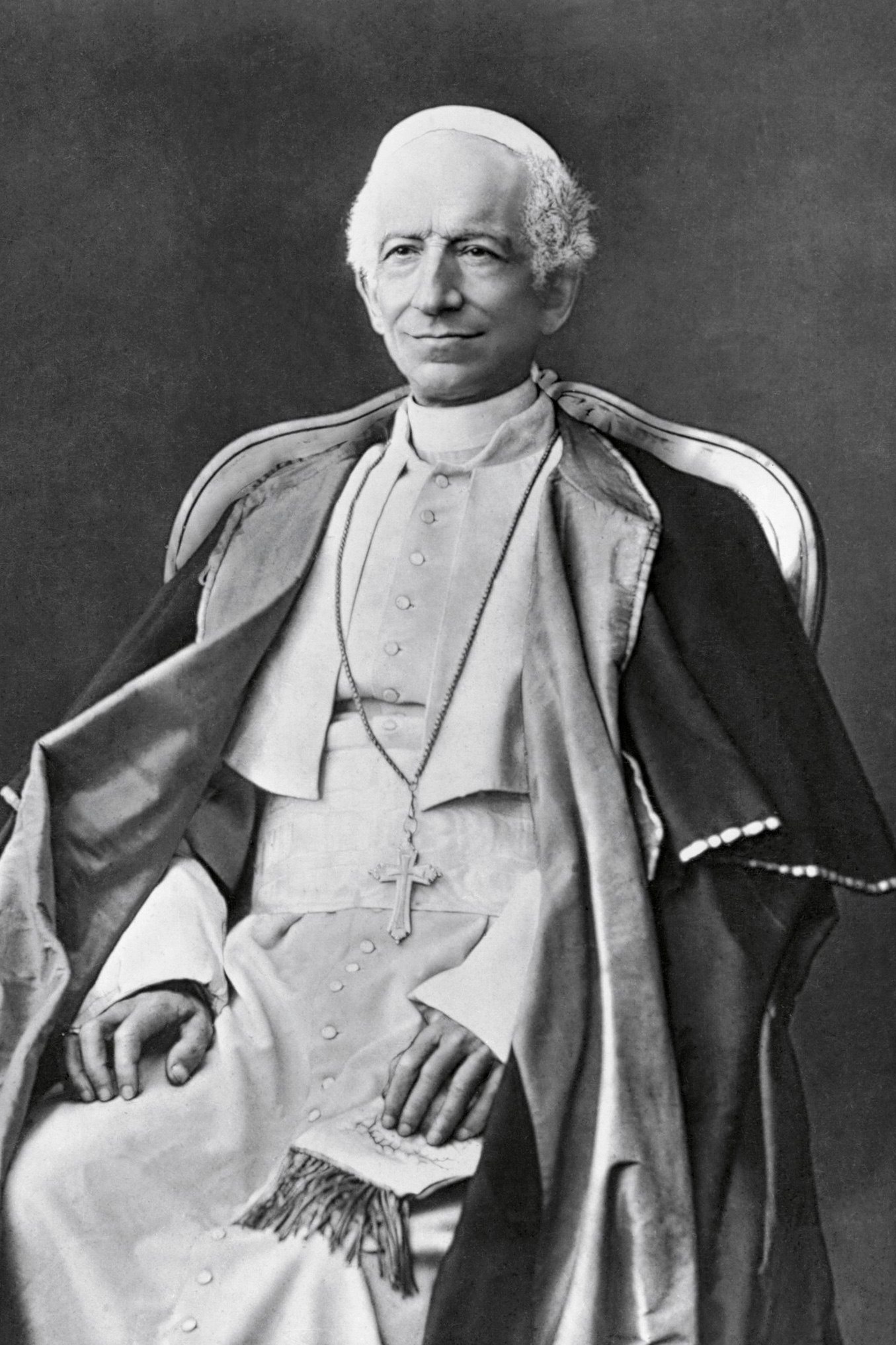Pope Leo XIII
 Pope Leo XIII (; born Gioacchino Vincenzo Raffaele Luigi Pecci;; English: Joachim Vincent Raphael Louis Pecci.}} 2March 181020July 1903) was head of the Catholic Church from 20 February 1878 until his death in July 1903. He had the fourth-longest reign of any pope, behind those of Peter the Apostle, Pius IX (his immediate predecessor), and John Paul II.
Pope Leo XIII (; born Gioacchino Vincenzo Raffaele Luigi Pecci;; English: Joachim Vincent Raphael Louis Pecci.}} 2March 181020July 1903) was head of the Catholic Church from 20 February 1878 until his death in July 1903. He had the fourth-longest reign of any pope, behind those of Peter the Apostle, Pius IX (his immediate predecessor), and John Paul II.He is well known for his intellectualism and his attempts to define the position of the Catholic Church with regard to modern thinking. In his 1891 encyclical ''Rerum novarum'', Pope Leo outlined the rights of workers to a fair wage, safe working conditions, and the formation of trade unions, while affirming the rights to property and free enterprise, opposing both socialism and ''laissez-faire'' capitalism. With that encyclical, he became popularly called the "Social Pope" and the "Pope of the Workers", also having created the foundations for modern thinking in the social doctrines of the Catholic Church, influencing his successors. He influenced the Mariology of the Catholic Church and promoted both the rosary and the scapular. Upon his election, he immediately sought to revive Thomism, the theological system of Augustine of Hippo and Thomas Aquinas, wishing to make it the official political, theological, and philosophical foundation of the Catholic Church. As a result, he sponsored the ''Editio Leonina'' in 1879.
Leo XIII is remembered for his belief that pastoral activity in political sociology is also a vital mission of the church as a vehicle of social justice and maintaining the rights and dignities of the human person. He issued a record eleven papal encyclicals on the rosary, earning him the title "Rosary Pope". He also approved two new Marian scapulars. He was the first pope never to have held any control over the Papal States, which had been dissolved by 1870, since Stephen II in the 8th century. Similarly, many of his policies were oriented toward mitigating the loss of the Papal States in an attempt to overcome the loss of temporal power, but nonetheless continuing the Roman Question. After his death in 1903, he was buried in the Vatican Grottoes. In 1924, his remains were transferred to the Archbasilica of Saint John Lateran. Provided by Wikipedia
Showing 1 - 15 results of 15 for search 'Pecci, Gioacchino', query time: 0.02s
Refine Results
-
1by Pecci, GioacchinoOther Authors: “…Pecci, Gioacchino…”
Published 1901
Call Number: Loading…
Located: Loading…Book Loading… -
2by Pecci,GioacchinoOther Authors: “…Pecci,Gioacchino…”
Published 1960
Call Number: Loading…
Located: Loading…Book Loading… -
3by Pecci, Gioacchino, CardOther Authors: “…Pecci, Gioacchino, Card…”
Published 1879
Call Number: Loading…
Located: Loading…Book Loading… -
4by CARDENAL Pecci, GioacchinoOther Authors: “…CARDENAL Pecci, Gioacchino…”
Published 1960
Call Number: Loading…
Located: Loading…Book Loading… -
5by PECCI, GIOACCHINO CARDENALOther Authors: “…PECCI, GIOACCHINO CARDENAL…”
Published 1960
Call Number: Loading…
Located: Loading…Book Loading… -
6by Pecci, Gioacchino 1810-1903Other Authors: “…Pecci, Gioacchino 1810-1903…”
Published 1959
Call Number: Loading…
Located: Loading…Book Loading… -
7by Pecci, Gioacchino 1810-1903Other Authors: “…Pecci, Gioacchino 1810-1903…”
Published 1960
Call Number: Loading…
Located: Loading…Book Loading… -
8by Pecci, Gioacchino 1810-1903Other Authors: “…Pecci, Gioacchino 1810-1903…”
Published 1899
Call Number: Loading…
Located: Loading…Book Loading… -
9Other Authors: “…Pecci, Gioacchino 1810-1903…”
Call Number: Loading…
Located: Loading…Book Loading… -
10by PECCI, Gioacchino (después León XIII)Other Authors: “…PECCI, Gioacchino (después León XIII)…”
Published 1958
Call Number: Loading…
Located: Loading…Other Loading… -
11by PECCI, Gioacchino (después León XIII)Other Authors: “…PECCI, Gioacchino (después León XIII)…”
Published 1879
Call Number: Loading…
Located: Loading…Other Loading… -
12by PECCI, Gioacchino (después León XIII)Other Authors: “…PECCI, Gioacchino (después León XIII)…”
Published 1960
Call Number: Loading…
Located: Loading…Other Loading… -
13by León XIII, Papa, 1810-1903Other Authors:
Published 2007Biblioteca Universidad Eclesiástica San Dámaso (Other Sources: Biblioteca de la Universidad de Navarra, Biblioteca del Instituto Superior de Teología de las Islas Canarias, Biblioteca del Seminario Diocesano de Jaén)Call Number: Loading…
Located: Loading…Book Loading… -
14Published 1960Other Authors: “…Pecci, Gioacchino, Card., autor…”
Call Number: Loading…
Located: Loading…Book Loading… -
15by Péreire, Isaac 1806-1880Other Authors:
Published 1878Call Number: Loading…
Located: Loading…Book Loading…




